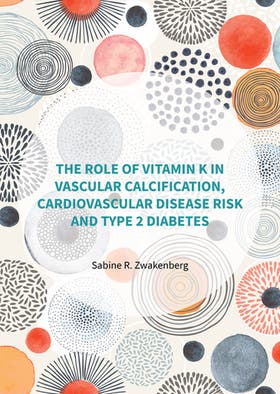Sabine Zwakenberg
The role of vitamin K in vascular calcification, cardiovascular disease and type 2 diabetes

- Datum
- (Co) promotoren
- 16-04-2019
- prof.dr.ir. Y.T. van der Schouw, prof.dr.ir. J. Beulens,
Samenvatting
Vitamin K occurs in our diet in two different forms, phylloquinone and menaquinones. Matrix Gla Protein (MGP) and osteocalcin are proteins which are dependent on vitamin K for their activation. MGP is an inhibitor of vascular calcification, and may reduce cardiovascular disease risk. Osteocalcin may play a role in the glucose metabolism. Therefore, a high vitamin K intake may reduce the risk of cardiovascular disease and type 2 diabetes. First, we showed that a high menaquinone intake may reduce the risk of coronary heart disease. Our Mendelian Randomization study, a method in which genetic variants are used as marker of vitamin K status, suggested that this relationship is causal. To provide further evidence for this hypothesis, we performed a randomized controlled trial assessing the effect of menaquinone supplementation on vascular calcification in patients with type 2 diabetes. We found not effect of menaquinone supplementation on vascular calcification. Vascular calcification can occur in the intimal or medial layer of the artery, these different types of calcification are driven by different risk factors: smoking is a risk factor for intimal calcification while diabetes is a risk factor for medial calcification. Advanced age, male sex and statin use are risk factors for both intimal and medial calcification. Finally, circulating phylloquinone may be causally related to a lower risk of type 2 diabetes. Future studies should assess whether this is due to activation of osteocalcin, since the current evidence is limited. In summary, this thesis suggests that vitamin K may reduce cardiometabolic risk.
